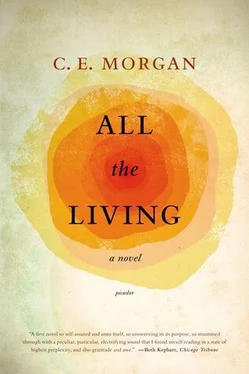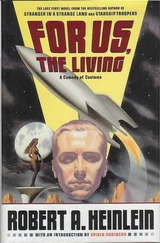This is it, he said slowly. It ain’t much.
Well, I don’t have an office. I think it’s pretty nice.
He looked at her and measured her words for a moment before he said, So I reckon you’re no secretary if you don’t have a office.
No, she said.
What’s it you do exactly?
Well, this mostly, she said. She picked at nothing on the grain of the wood.
He cocked his head to the side, still smiling. That don’t add up, he said. How do you eat?
Well, I’ve got a little money saved up, she said, which was true. She had exactly sixty dollars saved, which amounted to all the money she had made in one month at the job.
He nodded as if he understood. She turned abruptly and faced the door frame then, tapped her nails against the wood in a confounded rhythm, smiled as if she might laugh and then stopped herself. Looked at him again, looked away, and said, I guess I ought to play some more.
I reckon, he said. And she left. But the next day, after she had been playing for about an hour, he wandered out to the sanctuary, or at least to the door, and stood there and listened as she played and she knew he was there but pretended she didn’t. The next day he came all the way in. He stood by the piano for a moment and then went to the landing and sat down behind the piano a ways so that she could not see him, except for the length of his legs from the knees down. When she finished, she put her hands in her lap and leaned over to peer at him.
That’s some good playing, he said and he was shaking his head. How long you played like that?
Oh, eight or nine years, she said. I learned this piece when I was fifteen.
What is it? he said.
It’s a wedding march, but not the one you always hear, the one they always play. This is one people don’t ever get married to.
No kidding, he said and he laughed. Well, how would I know, I ain’t never been married.
I gathered that.
And now maybe I’m too old, he said and he looked over at her.
No, she said.
Thirty-six, he said. I’m a old man now. He smiled, watching.
That’s not really old, she said, but her denial seemed to confirm something for him and he looked out at the empty pews. They were silent.
You never did come back to the singles meeting, he said suddenly.
Oh, that, she said with a wave of her hand. That cut into my alone time.
He laughed, really laughed, with his head tossed back and she was pleased with herself and played a few trivial notes on the keyboard. When he quieted, he jointed his hands before him, his elbows on the white worn knees of his jeans. No, he said, I never married. Honestly, I don’t think folks care for it that much. But my daddy preached this church and that’s how I came to be here. They tolerate it, I suspect. I do the best I can for them.
Oh, I don’t think they tolerate you. They think you’re good at what you do.
Thank you, he said. I suspect they’d all just feel better if I had a wife.
Well, how come you never got married?
He looked intent on the pews. I guess I just never found that special girl.
Special girl, huh, Aloma said, raising her arched hands to the keys again and finding a few more notes, but still leaning to watch him. Why does she have to be so special? Is that because you think you’re so special?
She’d meant it as a joke, but he didn’t smile. His gaze faltered down and he moved his mouth as if he chewed on something sour, the muscle there belled and sank once. His color rose. Aloma righted quickly in her seat and began to play to cover her own embarrassment. With nothing in mind, she invented on the keys until she settled into G and without really choosing it, she began to play the hymn Orren had been humming the day she brought in the cows. She had not seen the hymn in a long time, but her fingers found the progressions and she closed her eyes and the bars came before her eyes like a scroll.
When the last chord rang out into the silent sanctuary, she opened her eyes and braved a glance at Bell and his face was turned down now, his thumbs pressed like stoppers to the inner corners of his eyes. When he looked up, awoken from himself, she saw the wetness on his cheeks. Aloma shrank behind the piano wall, sat there hunched in her ill ease, unable to reconcile herself to the tenderheartedness of mountain boys, not knowing whether to say something, say nothing, or play. She waited. But when he said nothing, nor moved one inch, and the silence had grown too large for the room, she said, I’m sorry. She did not know what she was sorry for.
No, no, he said, sounding very formal suddenly, his voice thick as if he were speaking through a mouth full of cotton wool.
She peered around the piano again. Did I do something wrong? she said, her hands sliding the dust from the slip below the keys where he could not see them.
He stretched his neck, first to the right, then to the left as though it hurt. That’s a hymn we sang at Daddy’s funeral. He looked at her with a funny little grin. He wanted that one, he said. It was his favorite. I can’t have thought of it in quite a while. You took me by surprise. Ain’t that funny, he said, more to himself than to her. Funny how somebody can pass and be gone a long time and then something… happens, you hear a snatch of music and it feels all over again like they can’t be dead. Like their dying was just a mean trick of memory or something like that. But they are really gone from this place, I guess. There’s a resurrection, there’s a time for reuniting. That’s what that feeling is, I guess, knowing it beforehand, disbelieving they’re dead. Your head says they’re dead, but then you feel that they can’t be dead, not really, and it’s the feeling that’s the knowing. I do believe that. He surveyed the small sanctuary. Then he cleared his throat and looked at her and his eyes were very open. Course, you’re very young. I reckon you still got your folks.
No, they’re dead.
He started back. Oh, forgive me. I ought not to a said that.
She shrugged. They’ve been dead since I was three. I don’t remember anything. And it was true. She didn’t remember a kiss or a scent or even any sentiment other than a muted awareness that they were gone to associate with them. As a child, she’d tried to invent the feeling of loss inside her. But like the dead, the feeling simply wasn’t there. It was not that her uncle and aunt filled up the space that her parents vacated; it was just that the empty space was fine as it was and no more hurtful than being born with four fingers on one hand instead of five. It was just a lack she thought didn’t mean anything.
I’m very sorry, Miss Aloma, he said and he looked at her in a steady way with his surprised, almost black eyes and she tossed off, It doesn’t bother me one bit, but in such a blithe manner that it sounded almost cruel — she felt it as soon as she said it — though she couldn’t be sure if it was cruel to Bell, or her dead parents, or only to herself. But she’d balked at his words and the gravity of his look and she had the sour feeling that he was apprehending a grief that wasn’t there. He straightened up from the steps then, sharp and a bit too fast, and he stood stiff so he looked to her eyes like a boy playing soldier. But a very tall one.
Thank you for playing that song, Miss Aloma, he said very carefully, passing a hand down the front of his shirt. Thank you very much. And he turned and passed through the door that led into the back of the building and she was left alone sitting at the piano. She watched the afternoon sun creep across the floor, slow as glass it moved before her eyes. She took up her scores in her arms then. But she laid them down again beside her on the bench, still not taking her gaze from the canted light, and placed her fingers blindly on the keys and she played. Once again, she felt the upswell of pleasure she’d been missing for so long and then a thought crossed her mind, that the preacher might be standing on the other side of the door, that he might be listening, and this gave her a different kind of pleasure, one that was new to her.
Читать дальше
Конец ознакомительного отрывка
Купить книгу











